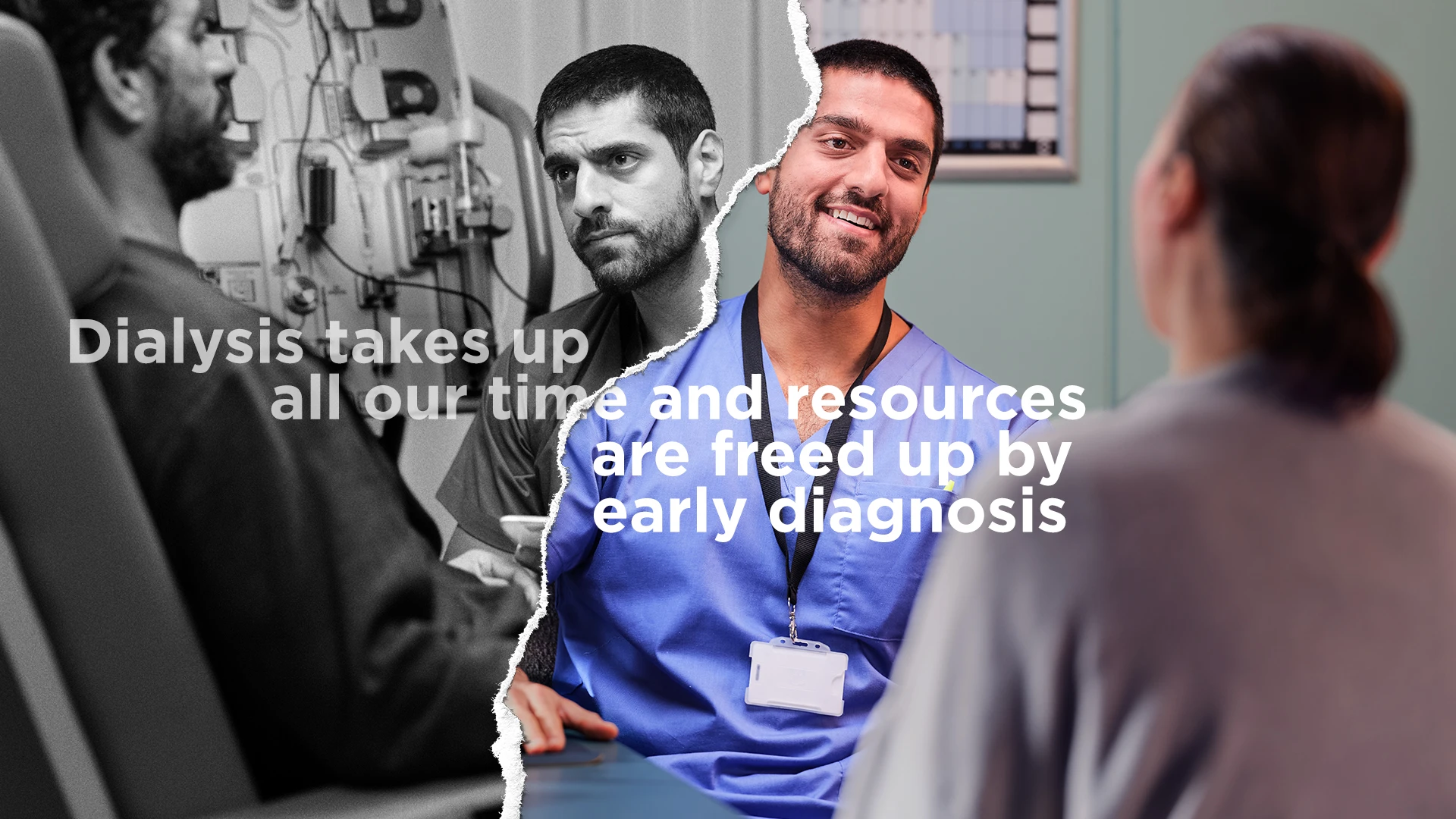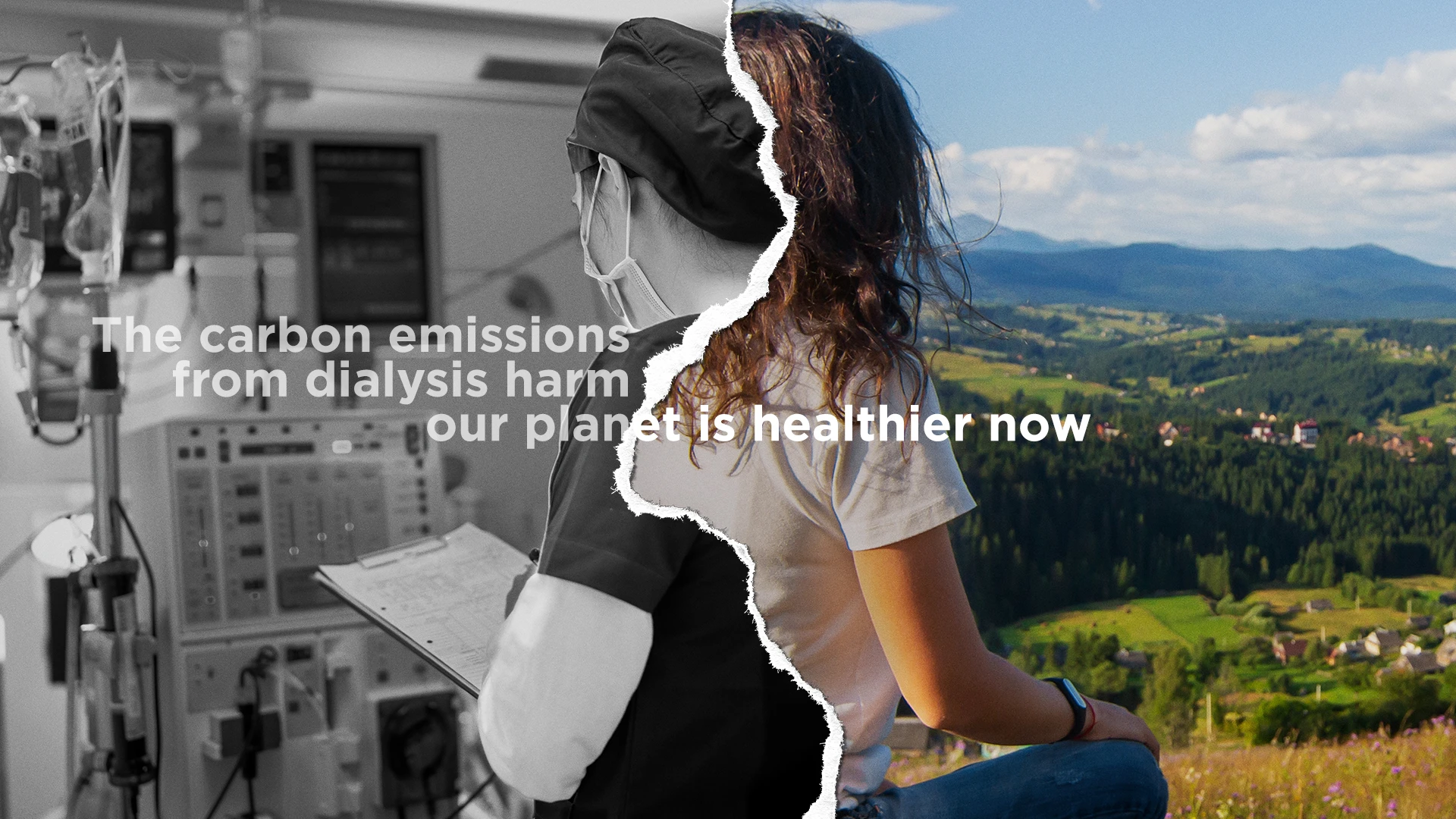
We can transform the lives of people with CKD and the world around them.
Make the Change for Kidney Health calls on governments and policymakers to recognize CKD as an urgent global health priority to implement patient-centered and evidence-based policies to enable earlier detection, diagnosis and immediate access to care and recommended treatments to bring the best possible outcomes for patients, healthcare systems, caregivers, the economy and the planet.
See what happens when we make the change…
Understanding Chronic Kidney Disease
CKD affects nearly 850 million people globally4
Projected to be the world’s fifth leading cause of death by 20405
CKD is one of the biggest public health challenges we face today.1 Yet it is vastly under diagnosed, as it is often asymptomatic until it progresses to later, more severe stages.2 In fact, fewer than 10% of people with CKD are aware of their disease.3
Due to the high prevalence of CKD in people with hypertension, cardiovascular disease, and diabetes, there is an opportunity for early identification using shared risk factors.9-12
-25 yrs
reduced life expectancy if no action is taken and CKD reaches advanced stages.8
2 – 3%
of the annual healthcare budget in high-income countries is spent on end-stage kidney disease treatment.13
$35K – $100K
The range of annual costs for dialysis and kidney transplantation for a patient with kidney failure.14
81.6M missed workdays
in diagnosed patients and 11.89 million missed workdays by caregivers of CKD patients over the next 10 years in the UK alone.15
More than 169 billion liters
of water consumed & 1 billion kilograms of waste generated globally each year by dialysis treatment globally.16,17
Why We Need to Make the Change
Together, our ambition is for a future in which early detection, diagnosis and immediate access to recommended treatment and care can empower those affected by CKD to live better, healthier lives.
Routine testing for people at high risk of CKD – with affordable, quick and simple tests delivered in a primary care setting – can help more people get diagnosed earlier and enable swifter access to potentially life-changing care. Readily available and cost-effective treatments, if administered early, can slow the progressive loss of kidney function and reduce the risk of kidney failure.3,18
We need to act now to bring the best possible outcomes for patients, healthcare systems, caregivers, the economy and the planet. We are here to Make the Change for Kidney Health.
Taking Action on Kidney Health
will Deliver 5 Key Benefits
With changed health policies and guidelines that encourage early screening, diagnosis and treatment, we can:
How to Get Involved and Act Now
Make the change by lending your voice on social
Download useful resources and evidence to understand why policy action is urgently needed
Stay up to date on the latest news and resources from the campaign by getting in touch
Resources
Stay in touch
Stay up to date on the latest news and resources from the campaign by signing up here
By providing your personal information, you’re giving the Global Patient Alliance for Kidney Health permission to add you to its database and send you newsletters and other communications via email. Further information about the protection and usage of your personal data is available in Privacy Policy. You can unsubscribe at any time by using the link at the bottom of every email sent by GloPAKH.

References
- Kovesdy. Epidemiology of chronic kidney disease: an update 2022. 2022. Available from: https://pubmed.ncbi.nlm.nih.gov/35529086/ [Last accessed 22 January 2024]
- Tangri, N., Moriyama, T., Schneider, M. P., Virgitti, J. B., de Nicola, L., Arnold, M., Barone, S., Peach, E., Wittbrodt, E., Chen, H., Järbrink, K., & Kushner, P. (2023). Prevalence of undiagnosed stage 3 chronic kidney disease in France, Germany, Italy, Japan and the USA: Results from the multinational observational REVEAL-CKD study. BMJ Open, 13(5). https://doi.org/10.1136/bmjopen-2022-067386 [Last accessed 29 February 2024]
- GBD Chronic Kidney Disease Collaboration. Global, regional, and national burden of chronic kidney disease, 1990–2017: a systematic analysis for the Global Burden of Disease Study 2017. 2020. Available from: https://www.thelancet.com/article/S0140-6736(20)30045-3/fulltext [Last accessed 11 January 2024]
- Jager et al. A single number for advocacy and communication—worldwide more than 850 million individuals have kidney diseases. 2019. Available from: https://pubmed.ncbi.nlm.nih.gov/31582227/ [Last accessed 11 January 2024]
- Foreman et al. Forecasting life expectancy, years of life lost, and all-cause and cause-specific mortality for 250 causes of death: reference and alternative scenarios for 2016-40 for 195 countries and territories. 2018. Available from: https://pubmed.ncbi.nlm.nih.gov/30340847/ [Last accessed 22 January 2024].
- National Kidney Foundation. How your kidneys work. Available at: https://www.kidney.org/kidneydisease/howkidneyswrk [Last accessed 11 January 2024]
- Said et al. The link between chronic kidney disease and cardiovascular disease. 2014. Available from: https://www.ncbi.nlm.nih.gov/pmc/articles/PMC4119330/pdf/jnp-3-99.pdf [Last accessed 9 February 2024]
- Jankowski et al. Cardiovascular Disease in Chronic Kidney Disease. 2021.
- Jitraknatee et al. Prevalence and Risk Factors of Chronic Kidney Disease among Type 2 Diabetes Patients: A Cross-Sectional Study in Primary Care Practice. 2020. Available from: https://www.nature.com/articles/s41598-020-63443-4 [Last accessed 11 January 2024]
- U.S. Department of Health and Human Services. Chronic Kidney Disease in the United States, 2023. 2023. Available From: https://www.cdc.gov/kidneydisease/pdf/CKD-Factsheet-H.pdf [Last accessed 30 January 2024]
- Stevens et al. Chronic kidney disease management in the United Kingdom: NEOERICA project results. 2007. Available from: https://www.kidney-international.org/action/showPdf?pii=S0085-2538%2815%2952513-1 [Last accessed 11 January 2024]
- Centers for Disease Control and Prevention. Diabetes andChronic Kidney Disease. 2022. Available from: https://www.cdc.gov/diabetes/managing/diabetes-kidney-disease.html [Last accessed 11 January 2024]
- Luyckx et al. The global burden of kidney disease and thesustainable development goals. 2018. Available from: https://www.ncbi.nlm.nih.gov/pmc/articles/PMC5996218/ [Last accessed 11 January 2024]
- Levin et al. Global kidney health 2017 and beyond: a roadmap for closing gaps in care, research, and policy. 2017. Available from: https://www.researchgate.net/publication/320583454_Global_kidney_health_2017_and_beyond_a_roadmap_for_closing_gaps_in_care_research_and_policy [Last accessed 22 January 2024]
- Sanchez and Wheeler. #4271 The Growing Burden of Chronic Kidney Disease in the UK: An Impact CKD Analysis. 2023. Available from: https://www.researchgate.net/publication/371565010_4271_THE_GROWING_BURDEN_OF_CHRONIC_KIDNEY_DISEASE_IN_THE_UK_AN_IMPACT_CKD_ANALYSIS [Last accessed 12 February 2024]
- Vanholder et al. Fighting the unbearable lightness ofneglecting kidney health: the decade of the kidney. 2021. Available from:https://www.ncbi.nlm.nih.gov/pmc/articles/PMC8243275/ [Last accessed 12 January2024]
- Wieliczko et al. Eco‑dialysis:fashion or necessity. 2020. Available from:https://www.ncbi.nlm.nih.gov/pmc/articles/PMC7060957/ [Last accessed 12 January2024]
- Bello et al. Effective CKD Care in European Countries:Challenges and Opportunities for Health Policy. 2014. Available from: https://pubmed.ncbi.nlm.nih.gov/25455091/ [Last accessed 11 January 2024]
Disclaimer
This campaign is co-created with the Global Patient Alliance for Kidney Health as well as funded and produced by AstraZeneca.
The information on this website is provided by AstraZeneca and the Make the Change for Kidney Health campaign partners for awareness purposes only. It should not be used for diagnosing or treating a health problem or disease. If you have any questions about your medical condition, talk to a healthcare professional.





